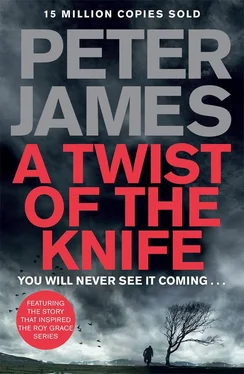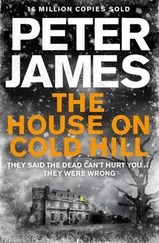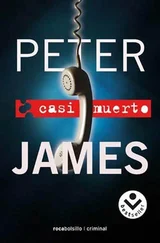‘Darling! Darling? How are you doing?’ Juliet yelled. ‘Are you OK?’
He shone his torch at the tangle of wire and rope. As he did so the boat keeled over violently and the wind ripped at his face and hair. Below him, he heard Juliet scream. The bosun’s chair was swinging wildly, and suddenly, despite his efforts, it stopped. Tangled up in the mess, too.
‘Bugger!’ he shouted out in frustration.
‘What is it, Tony?’
There were times when you had to make fast decisions at sea. This was one of them. The companionway hatch, which he had climbed up through, was open. If they did get knocked flat, the sea would pour in and down into the saloon. If that happened, they were doomed. Juliet and he would stand no sodding chance of survival 15,000 miles out into the Indian Ocean in the little inflatable life raft with its emergency provisions of a small quantity of water and a couple of bars of chocolate. It was designed to keep them alive for a few hours, or a couple of days at the outside, before they were rescued. There was only one option.
He began to cut the mainsail, stabbing it, ripping it, then moving his knife as far as he could reach. Within seconds, the wind made the tear wider. Then wider still.
‘Tony!’ Juliet called. ‘What’s happening?’
He tried to shout back, but he couldn’t find the energy. Instead he spoke softly into the brutal wind. ‘It’s OK, we’re safe!’
‘Tony?’
The band was tightening around his chest.
‘Tony?’
He saw faces appearing out of the darkness. The faces of beautiful women. All of them were calling out, ‘Tony! Tony! Tony!’
Somewhere in the distance he heard Juliet’s voice, anxiously calling, ‘Tony? Tony! TONY!’
The yacht was easier to steer now, with the torn mainsail flapping around like laundry on a line above her. But the wind was so intense that whenever she tried to let go of the wheel, the yacht keeled over so sharply she was scared it would go flat, even on its bare rigging. She fought the wheel, trying as desperately hard as she could to keep the prow head-on into the strengthening and constantly veering wind, which seemed as if it was playing a weird game of catch-me-if-you-can, and constantly having to close her eyes against the stinging spray and rain. Again and again, she called out, ‘Tony! Tony! Tony!’
Finally, without the storm letting up, dawn began breaking, slowly, after the longest night of her life. She kept on shouting her husband’s name. As the sky steadily lightened, she could see Tony’s silhouette at the top of the mast appear intermittently, as a strip of torn mainsail alternately wrapped itself partially around him, then flapped away. Steadily he became more detailed. He sat up there, silent, strapped into the bosun’s chair, his head slumped forward, swinging to port and then starboard with each roll of the boat.
Her voice was hoarse from shouting. The rain and spray had long since stopped and now her eyes were raw from crying. This wasn’t happening, please God, this was not happening.
‘Tony!’ she called again. ‘Wake up, Tony, please wake up!’
He rolled around like a rag doll in his yellow T-shirt, blue denim shorts and plimsolls, the gloves making him look like some kind of mechanic.
‘Tony!’ she called again and again, with increasing desperation. The storm was beginning to ease. The swell was still very heavy, though, with the boat riding waves and almost pitchpoling. Over the course of the next two hours, the wind dropped steadily, and as it did, the sea slowly calmed down.
Finally, she felt able to leave the helm. She locked the wheel, clambered up onto the deck, still clipped to her safety wire, and stumbled on all fours to the mast. She stared up at her husband and called out again, repeatedly, her throat raw and her voice croaking, ‘Tony, Tony, TONY!’
She tried to climb the mast, but each time, swaying wildly, she only got a few feet above the deck before sliding down and burning her hands, painfully, on the raw wires. ‘Tony! Tony! Tony!’
There was no response. And now in full daylight, as the torn strip of sail flapped away from him again, she could see why not. His eyes were wide open, but he wasn’t blinking. They just stared, sightlessly.
Sobbing, she pulled at the wires, trying to free the bosun’s chair high above her from the tangle, but all that happened was the burns on her hands became worse. Finally, she gave up, crawled back to the cockpit and went below.
She switched on the radio and tuned it to Channel 16, the international maritime channel. But all she got was a buzz of static. She tried other channels, but the same buzz greeted her. All the same she returned to Channel 16 and sent out a Mayday distress signal. The satnav wasn’t working, and she could only figure out their approximate position from Tony’s last plot of the chart on the chart table. She gave their approximate position and asked for urgent medical help.
The only response she got was more of the same static buzz.
She went back on deck and looked up with a shudder, past her husband’s swinging body by the spreaders, close to the very top of the mast, where the radio aerial, transponder and satellite navigation receptors were — and where the yard arm would have been on an older boat. And she saw, to her dismay, that they had gone. Presumably torn away by the tangle of rigging in last night’s storm.
She wept uncontrollably. ‘Tony, please don’t do this to me. Don’t leave me. Not here. Don’t, please no!’
She stared up at the dark grey sky. And then at the expanse of dark green ocean all around them, which stretched out to the horizon in every direction. According to the chart, Christmas Island was a couple of hundred nautical miles behind them. Sri Lanka was still well over a thousand miles ahead of them. Indonesia was several hundred miles to starboard. It would be days of sailing to reach them, days taking her away from the most direct route home.
Tony was dead. She had to accept that, she knew. It wasn’t going to make any difference whether it was a few days now, or two weeks. Her best option, she decided, was to keep to their course, and hope that her Mayday had been heard. If she saw a commercial ship or another yacht on the horizon, or if a plane flew overhead, she would fire off one of the flares they had on board. Her best hope was that her distress signal had been picked up, but she wasn’t confident about that.
Maybe a helicopter would appear? But she was pretty sure they were out of range for one. Then, cursing herself for forgetting it, she swore aloud as she suddenly remembered Tony’s satellite phone.
‘Of course! How could I be so stupid?’ It didn’t need a mast! Tony had bought it for emergencies, justifying the expense by telling her that even if they lost all their electrics, they could still use it to call for help.
She clambered back down into the saloon, and found it safely stowed in the cupboard to the right of the chart table. She unclipped it, studied it for some moments, then pressed the power button. After a few moments, the display came on. Several symbols appeared, one showing that there was 80 per cent of the battery life left. Then, to her dismay, there was a request for the code.
And she had no sodding idea what that was.
‘For God’s sake, Tony,’ she cursed under her breath. ‘Why the hell did you need a pass code?’
Then she remembered a piece of wisdom Tony had once given her a long time ago, and that was to never panic. Panic was what killed people, he had said. Survivors of disasters were those who were able to keep calm and clear-headed, no matter how bad the situation they faced.
And bad situations did not get much worse than the one she was currently in.
‘Good advice, Tony!’ she said aloud. Doing her best to keep calm and clear-headed, she thought about the pass codes they had always used. The one for their burglar alarm at home was the first one that came to mind. Her year of birth: 1954. Whenever they had stayed in a hotel anywhere and there was a code required for the safe in the room, they had used the same one: 1954.
Читать дальше












